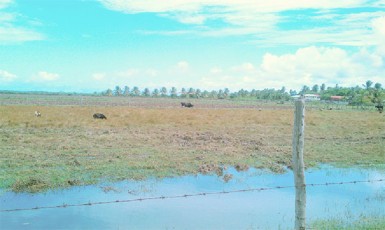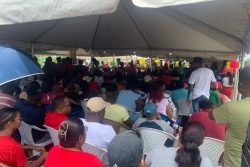Amidst endless cattle pastures and yellow rice fields, sits the small village of Fairfield in Mahaica. The land on which the village is situated was owned by white planters during the indentureship period but was sold in 1985 to John Fernandes which took over the estate, generating jobs for many villagers as well as people from neighbouring communities.
Fairfield is nestled between Broomhall and Bath and approximately 400 people make their homes there, most of whom are East Indian. 48.5 kilometres away from Georgetown, the village is unaffected by gun crimes and robberies and murders. “This is a quiet place…everybody knows everybody. You don’t find them things happening here,” Deonarine Ramnarine told Stabroek News while reclining in his hammock.
Ramnarine said that he had spent most of his life in Fairfield, growing up and catching fish with the other boys in the neighbourhood. Sixty-five years later, Ramnarine still catches fish, only this time not for sport but for a meal. “There is not much we can do here but it is good. People in town can’t go to their backyard and pick a coconut or a boulanger… they have to go the market to buy, but I can go at the back of my yard and pick it and catch my own fish in the trench corner,” he said.
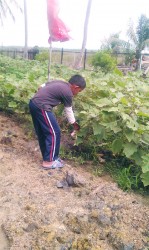
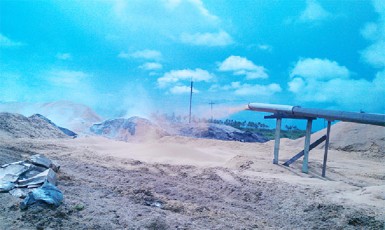
Small wooden houses are scattered across the area but the land is largely dominated by acres of rice fields, along with pasture lands for cows and sheep to graze. The people are not afraid that their cattle would be stolen when left in the fields. However, most villagers rarely enjoy the spoils of a rice harvest. Most of the rice lands are owned by the Fernandes, Ramnarine said, noting that there are hardly any small-scale farmers since most of them had not been granted land.
“Some of us ain’t get the land to plant… or the money to do it,” he explained. The majority of cattle farmers had to sell their land and begin working at Fairfield Rice Inc, which is also owned by the Fernandes.
Yet there are still some farmers who remain committed to their pasture lands and farms. The products would either be sold to the Mahaica market or consumed by the farmers’ family. There is hardly ever a need to leave the village, Ramnarine said, adding that a grocery van would pass on the road on Fridays and Saturdays from which people would buy. There are only two grocery shops in the village and one beer garden where people would hang out on weekends.
Years ago, he said, there was a bridge leading to the river and people used to go to watch the waves come in, but since the bridge was torn down and a canal dug in its place persons hardly ever visited the river. “It was so beautiful. There were so many shells and it was nice to watch the water come in… now we can’t… those of us who are Hindus can’t even do our religious works there… we have to go to the other villages ’cos people are afraid to cross the canal. We use to catch fish by the seaside,” he said.

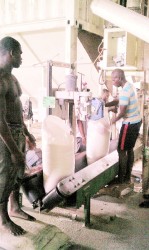
Fairfield, however, has lost a number of villagers over the years to migration. No longer were there picnics on the seawall on Saturdays or cricket in the ground on Sundays, Ramnarine said, lamenting that time and “greener pastures” had
changed his small haven.
And most youths had migrated to foreign countries or moved to the city to study, leaving the older people with memories of a village long ago. Latchman Balkram, 67, is one of them. He said that he liked the village because it was the place he knew best. He grew up with his family in Fairfield and then married when he was in his early twenties.
“When I was young I use to play cricket at Enterprise and I saw this girl in 1969 and she was pretty so I steal her away and bring her here with me, and since then we have lived here, raised children and built our home and life,” he said.
His wife, Kalawattie, said that the first time Balkram brought her to the estate she fell in love with it and didn’t want to leave. “This place was nice when I first came here. You had everything fresh…I could have planted my garden and mind chickens,” she said, recalling that Balkram use to catch fish in the trench under the bridge and bring it home to cook.
“I use to seh I want cook and he would say ‘hold on! I’m coming back… go grind the massala and geera’ and he would come back with fish and we would cook fish curry and eat,” she reminisced. But now she said they would have to walk far to catch fish and get vegetables. “But we make do… I would still plant my kitchen garden and chicken and he would catch the fish,” she added.
The Balkrams, however, complained that there were no activities to keep the remaining youths in the village occupied in the afternoons or on weekends. “They build a community centre, [and] it left there as a monument,” Balkram said.


Fairfield has one church and a temple and Hindus from other villages would sometimes visit the temple there. There is no health centre or schools in the area and children travel to nearby villages to attend school.
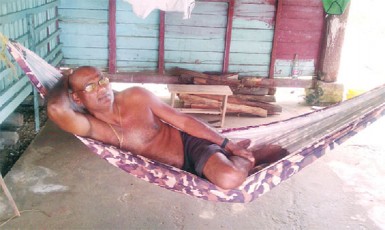
”
